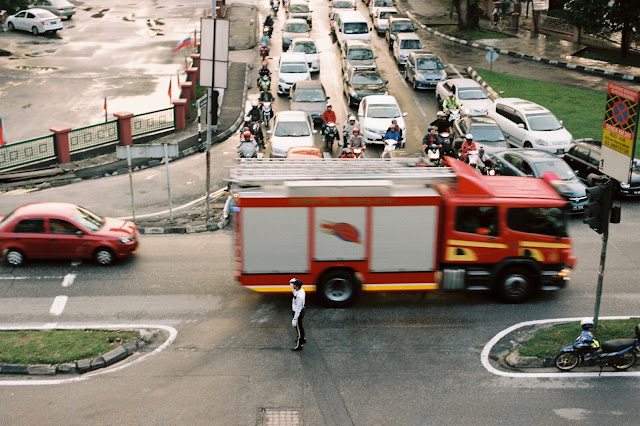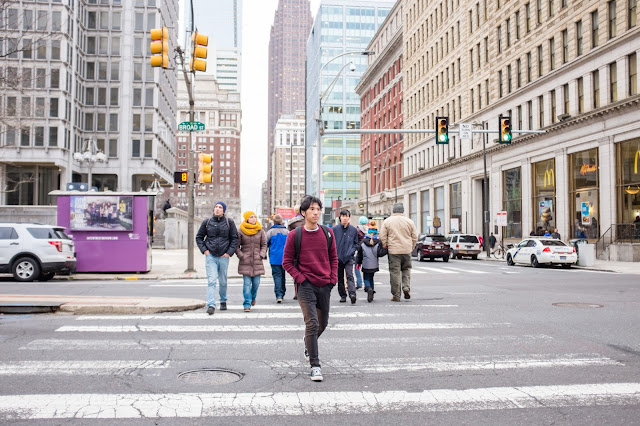Hey, everyone.
It's been so long since I actually went out to shoot anything, be it a concert, an event or even an editorial (not to mention how long it's been since my last significant entry). It's not that I don't want to nor is it really a matter of not having the time. I guess it's come down to the fact that I haven't had any drive to do anything other than get my Master's degree over with.
It's been an exhausting process to simply get things done. The thing I've been lamenting the most is the minor yet tedious things I have to do. I've done my writing and I am absolutely happy with my results. It's just these dumb little things that have resulted in accumulated stress, which has got me stuck in an unpleasant mood these past few months.
So, to counter my breakdowns, I took it upon myself to do new things and try to change up my ways, which included sticking to film photography for a while. I had longed to commit myself to film. I had seen the work of past greats such as Josef Koudelka and William Eggleston, and currently admire the modernization of film by the likes of Ryan Muirhead, Eric Kim, Josh White, and Joe Greer. I've read about the freedom of not having to post-process, the pleasure of shooting in the moment, the challenge of getting things right in-camera, and the beaten-to-death phrase "film aesthetic".
Much film. Such aesthetic.
FM2 + Portra 160
I had tried my hand at various film cameras before. I really liked the analogue cameras, especially the Nikon FM2. The Nikon FE10 was a bit iffy and the Yashica Electro 35 GS was just too complicated to like. But the problem with analogue cameras was the reliability of the built-in light meters and the high likeliness of the film getting ruined for some reason. Therefore, in light of my past experiences, I settled on using my brother's Nikon F100, which is essentially a DSLR that shoots film. The metering is done electronically, it has autofocus and it winds film automatically, which meant risk had been drastically lowered.
At first it was sort of fun, shooting stuff but not getting to instantly look at it. As much as I hate overused phrases, I do believe that there is always that "honeymoon period" with new things. For me, it was the chance to reignite my passion for photography and finally get myself back into the rhythm of shooting again. And if I were shooting again, I would also be writing again or even be making new videos for my YouTube. It was all supposed to be great, that I had found my new inspiration.
F100 + ProPlus II 200
F100 + ProPlus II 200
But months passed by and I couldn't bring myself to shoot anything. I would sometimes bring the F100 along on trips, like how I would when reviewing cameras, but nothing would grab my interest. And even if something did, it wasn't interesting enough to "waste" my film on. It became a struggle to even find anything worth shooting. Even when I went to the USA and visited some cool places, I really had no intention of taking any photos. By this time, I wasn't sure whether it was my personal struggle with my mental health or merely my impatience to shoot with film that inhibited my ability to just take photos. Either way, I was only becoming more stressed when I came back from that trip having only shot one roll of film over a course of two weeks.
F100 + Tri-X 400
F100 + Tri-X 400
F100 + Tri-X 400
The thing is, shooting digital in RAW gives me something to do other than just take the photo. It enables me to immediately detect my mistakes, correct them in post but also remember to not repeat them in the future. Editing photos for hours in Lightroom lets me try out new ways to process photos, whether I want to portray a solemn mood or a cheery vibe in one photo, or curate the final 10 photos out of 1,000 to share with my friends. Post processing is a process I love and have learned to cherish over the years as it gives me the opportunity to be even more creative and implement a bit of personality in my photos. With film, you only get what you shoot. You don't get to tell a deeper story, to tell the story in the tone that you want to. When I process my photos, I project myself into my product. I get to be myself through my photos, and it gives me joy.
Bright, optimistic vibes
Leica X
Contrasty and colorful
Leica X
Black & white emulation
Leica X
Funky colors using a VSCO preset
GoPro Hero 4
Natural tones
iPhone 5s
Color correction and isolation
Fujifilm X-T10
Many may disagree but instant gratification is honestly the best thing I could ever ask for. As a person with anxiety, I can't afford to wait months before I get to see the photo I shot on a trip I don't even remember. I want to see my work and I want to enjoy it wholeheartedly, but if I had only one single frame that I liked out of 36, then it isn't worth the wait at all. If I shot digital, I would be able to shoot hundreds more photos and, statistically, will end up with even more photos that I liked. I would still apply the same techniques, utilize the same amount of concentration and care, and most importantly give the photos the same respect I would give to photos shot on film.
Respect women
Fujifilm X100S
Now, don't take this as me saying I hate film or that I won't shoot film ever again. I still like film and appreciate the medium. For a lot of people, film is and always will be the only thing that they'll ever shoot. Maybe if I got my hands on a proper working analogue camera, I would enjoy shooting film more; mostly because it's different and challenging.
However, after all that's been said, I still have to tackle the problem of having no inspiration whatsoever to go out and shoot. At least now I know what I have to do, and knowing is half the battle. I'll try to get some cameras to review. That should cheer me up and provide the necessary pressure I need to get some photos.
Until then, take care.













Comments